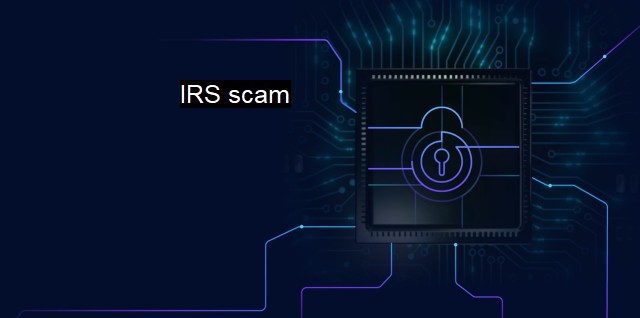What is IRS scam?
Preventing An IRS Scam: How to Protect Yourself from Malicious Social Engineering and Phishing Attacks During Tax Season
One of the pernicious types of fraud that circulate on the internet is what is commonly referred to as an "IRS Scam" - representing a major threat to personal cybersecurity. This is a fraud scheme orchestrated by scammers who masquerade as agents from the Internal Revenue Service in an attempt to exploit innocent victims into providing personal, often financial information. These scam operations are primarily carried out either through phone calls (a practice known as phishing), email communication, or fraudulent websites (a tactic known as spoofing).The IRS Scam is particularly menacing due to its ability to catch individuals off guard. The typical scheme centers around the scammer initially contacting an individual, either by phone or email, claiming to represent the Internal Revenue Service. The pretext of these communications usually involves accusations of fraudulent tax filings, unpaid taxes, or promises of tax refunds. Such threats typically compel the recipient to reveal personal information such as their Social Security number, bank or credit card account details out of panic or greed or face severe penalties, including arrests, prosecution, band and even deportation.
It is important to state that the IRS never initiates contact with taxpayers through email about a tax bill, refund or economic impact payments. They often send across physical mails for any officially authored communication. Thus, receiving such a call or email should immediately serve as a warning flag.
Cybersecurity measures and antiviruses play a prominent role in combating IRS scams. Antivirus software can detect and quarantine malware that might be installed on a victim's computer by visiting fraudulent IRS websites created by scammers. By specifically deploying sufficient protection in terms of internet security software on their devices, individuals can avoid being targeted by these scammers.
Meanwhile, cybersecurity measures and education form another layer of defense against these scams. This ranges from practicing safe email etiquette, such as not clicking on links or downloading attachments from unknown sources, maintaining up-to-date software on all devices, enabling spam filters, and backing up data regularly.
An individual's first step when contacted by a supposed representative of the IRS should be to persuade the caller to send official documentation by mail. the caller may refuse or make threats; it is essential not to entertain or engage with these threats – instead, hang up immediately.
If there's the slightest question about the legitimacy of an email, one should not open any attachments, click any links, or provide any personal or financial information. Instead, forward the suspicious email to phishing@irs.gov and immediately delete the original message.
Individuals are urged to report these incidents not only to the IRS but also to the Federal Trade Commission via their complaint website to ensure that appropriate enforcement action can be takes against these IRS scams.
Although IRS scams represent a significant threat to personal security and financial stability, they can be effectively combated through cybersecurity and antivirus measures, active awareness, and verification of any communication purportedly from the IRS. Staying vigilant, reporting suspicious activities and investing in robust antivirus software are steps people can take to protect themselves from falling victim to such scams.

IRS scam FAQs
What is an IRS scam?
An IRS scam is a type of phishing scam where scammers impersonate the Internal Revenue Service (IRS) in an attempt to steal money or personal information from victims. These scams often involve the use of fake phone calls or emails that appear to be from the IRS, requesting immediate payment or personal information.How can I identify an IRS scam?
There are several signs that may indicate an IRS scam, including unsolicited phone calls or emails claiming to be from the IRS, demands for immediate payment, threats of legal action or arrest, and requests for personal information such as social security numbers or bank account information. It's important to remember that the IRS will never contact you by phone or email for personal information or payment, and they will always communicate through official mail correspondence.What should I do if I receive an IRS scam call or email?
If you receive an IRS scam call or email, do not provide any personal information or payment. Instead, hang up the phone or delete the email immediately. You can also report the scam to the IRS by forwarding the email or calling their toll-free number at 1-800-366-4484. It's also a good idea to install anti-virus software on your computer and keep it updated to protect against phishing scams.How can I protect myself from IRS scams?
To protect yourself from IRS scams, it's important to be vigilant and cautious when receiving unsolicited phone calls or emails. Never provide personal information or payment without verifying the legitimacy of the request. You can also protect yourself by installing anti-virus software on your computer and keeping it updated, using strong passwords, and being cautious when clicking on links or downloading attachments from unknown sources.| | A | | | B | | | C | | | D | | | E | | | F | | | G | | | H | | | I | | | J | | | K | | | L | | | M | |
| | N | | | O | | | P | | | Q | | | R | | | S | | | T | | | U | | | V | | | W | | | X | | | Y | | | Z | |
| | 1 | | | 2 | | | 3 | | | 4 | | | 7 | | | 8 | | |||||||